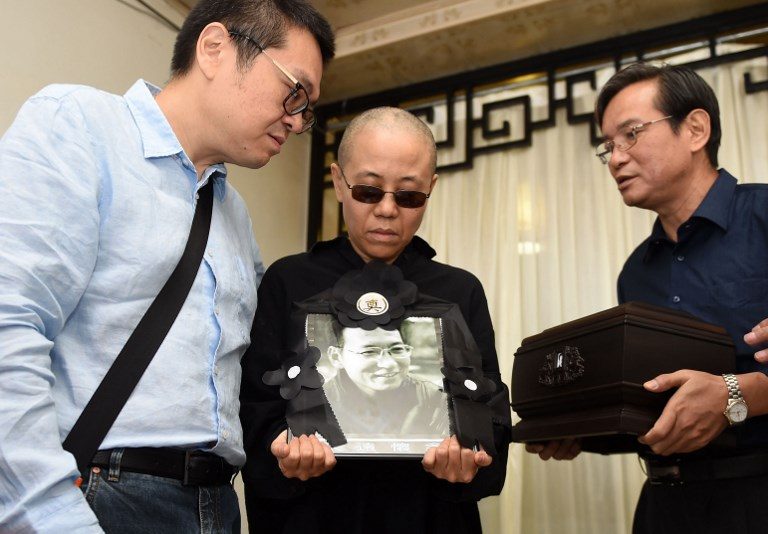SUMMARY
This is AI generated summarization, which may have errors. For context, always refer to the full article.

BEIJING, China – After her democracy activist husband was awarded the Nobel Peace Prize in 2010, Liu Xia was elated.
“I’m so excited, I’m so excited, I don’t know what to say,” the Chinese poet and painter told Agence France-Presse (AFP) over the telephone that October.
Liu thanked “all those people that have supported Liu Xiaobo” and “strongly asked” the Chinese government to release the dissident, who died Thursday, July 13, of liver cancer while on medical parole from an 11-year sentence for “subversion”.
Nearly 7 years ago, neither Liu nor her husband’s supporters foresaw the repercussions the award would have on her: a writer and artist who never considered herself a political person, who unflinchingly supported Liu Xiaobo but never actively participated in his campaigns.
Shortly after the Nobel announcement, Liu, 56, was put under house arrest, and has remained under heavy surveillance and control ever since.
Close friends have said she has limited access to the outside world, and was only occasionally permitted to leave her Beijing apartment to visit her parents or her husband at his prison in the northeastern province of Liaoning.
At a private funeral before his cremation on Saturday, July 17, a grieving Liu Xia and relatives stood in front of her husband’s body, and she “fixed her eyes on him a long time, mumbling to say farewell”, Shenyang city official Zhang Qingyang told reporters.
Following Liu Xiaobo’s release on medical parole last month, the dissident requested to receive treatment abroad – an unfulfilled wish that friends believed was for Liu Xia’s sake. (RELATED: China rebuffs calls to let ailing Nobel laureate go abroad)
“If he doesn’t get out now,” Ye Du, another dissident and close family friend, told AFP during the illness, “then he has no way to obtain freedom for his beloved wife.”
The primary doctor responsible for Liu Xiaobo’s treatment said at a press conference late Thursday that in the activist’s final moments, he told his wife to “live well”.
But where Liu Xia will live – and whether she will live freely – remains unclear.
Close friends have struggled to reach her since Liu Xiaobo’s death, and China has left unanswered the question of whether she will be allowed to leave the country.
‘At the edge’
“I didn’t have a chance/ to say a word before you became/ a character in the news,/ everyone looking up to you/ as I was worn down/ at the edge of the crowd,” Liu Xia once wrote in a poem to her husband.
It was a shared love of literature that brought the two intellectuals together in the 1980s.
She was an effervescent young poet, painter and photographer; he a public intellectual.
“She was not part of our group of dissidents,” Hu Jia, a Beijing-based activist and friend of Liu Xiaobo, told AFP.
“When I visited Xiaobo, she wouldn’t get involved with our political discussions. She just came out once in a while to share a laugh.”
The couple’s supporters often say that Liu Xia, who has never been formally charged, is guilty of nothing but the “crime” of being Liu Xiaobo’s wife.
“I want to marry that enemy of the state!” she said shortly before the pair wed in 1996 during Liu Xiaobo’s stay at a labour camp, according to a biography of the dissident by Yu Jie.
In turn, Liu Xiaobo lamented the political web in which Liu Xia had become entangled.
“My love for you,” he said in his final public statement, “is so full of remorse and regret that it at times makes me stagger under its weight.”
At the start of her house arrest, Liu Xia posted regular wry updates on Twitter for her concerned friends.
“It’s me, dummy Liu, no need to worry,” read her last tweet on October 18, 2010.
Sometimes the posts would sink into melancholy: “Why do we have to live this kind of life?” she wrote on June 16, 2010.
Virtually all of her friends’ attempts to visit her were stymied by the guards that stood sentry outside her apartment at all times.
Through the years of detention, Liu has suffered from depression and a heart condition.
Her father died last year, and her mother died earlier this year.
On a rainy night in the summer of 2012, Hu stood outside Liu’s apartment and aimed a laser pointer at the window of her study.
Liu looked out, but didn’t see him.
“She was just standing there alone, smoking a cigarette,” Hu said. “She looked so lonely.”
“(Now) our most important goal is to save Liu Xia from the bitter sea.” – Rappler.com
Add a comment
How does this make you feel?
There are no comments yet. Add your comment to start the conversation.